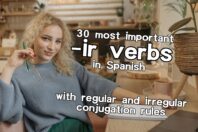An Introduction To Spanish Superlatives

Get our free email course, Shortcut to Conversational.
Have conversations faster, understand people when they speak fast, and other tested tips to learn faster.
More infoIn this post, we are going to teach you how to form the best Spanish superlatives.
(see what we did there?)
So what we do mean by the term superlative?
We can divide superlatives into two groups:
- Relative Superlative: indicates that something or someone has more or less of a certain quality than a group that we are comparing it to (he ran the fastest of any other person in the race).
- Absolute Superlative: describes quality in its highest degree, and doesn’t make any comparisons (his girlfriend is very beautiful).
Before we continue, we should mention that superlatives are one of three different types of comparative adjectives that you need to know in Spanish.
The other two are:
1) Comparisons of Equality
When both nouns are exactly the same.
- My mother is as intelligent as you are – Mi mamá es tan inteligente como tú lo eres.
2) Comparisons of Inequality
When two things, animals or people are not the same.
- I am taller than you. – Soy más alto que tú.
(ps, you can read more about the other comparative adjectives here)
Now back to Spanish Superlatives.
How to Form Spanish Superlatives
If you already know how to form comparative adjectives, then superlative adjectives are somewhat similar – with the addition of the definite article.
1) Regular Spanish Superlative Adjectives
When we want to talk about the most or least of something.
We simply add the adverbs “more” or “less” (más o menos) between the definite article and the adjective that you want to emphasize.
Here is the formula you need:
| Most formula | definite article (el, la, los, las) + más + adjective |
| Least formula | definite article (el, la, los, las) + menos + adjective |
- Daniela is the most intelligent girl I’ve ever met. – Daniela es la chica más inteligente que he conocido.
- My brother is the least prudent person when driving. – Mi hermano es la persona menos prudente al conducir.
2) Irregular Spanish Superlative Adjectives
In Spanish, as in English, there are adjectives that have single-word comparative and superlative forms, such as mejor (best), peor (worst), mayor (oldest, largest, biggest), menor (youngest/smallest).
These are known as irregular, since you don’t use más or menos with them.
Simply use the definite articles and the adjective superlative form.
- My father is the oldest of his brothers. – Mi padre es el mayor de sus hermanos.
- This movie is the worst of the entire saga. – Esta película es la peor de toda la saga.
| Adjective | English | Superlative Form | English |
| viejo | old | mayor | oldest |
| grande | big | mayor | biggest/largest |
| joven | young | mayor | youngest |
| pequeño | small | menor | smallest |
| bueno | good | mejor | best |
| mal | bad | peor | worst |
3) Absolute Spanish Superlatives
Absolute Spanish superlatives help us state the quality of something as an absolute – in other words, we aren’t referring to a quality relative to something or someone else in the group.
To form these, you need to take an adjective and add the words: muy (very), sumamente (extremely), or the suffix “-ísimo(-a, -os, -as)” in order to express a greater degree of a specific characteristic.
Absolute Spanish Superlatives normally follow one of the three below structures.
Muy + Adjective
Examples:
- Francisco’s dad is a very stubborn person – El de papá de Francisco es una persona muy testaruda
- She was very upset when she found out the truth – Ella estaba muy molesta cuando descubrió la verdad
Sumamente + Adjective
Examples:
- Poker is a game extremely addictive – El póquer es un juego sumamente adictivo
- Juan Carlos has become an extremely happy person – Juan Carlos se ha vuelto una persona sumamente feliz
Adjective + -ísimo(-a, -os, -as)
Whether they are able to express positive or negative qualities in the sentence. This type of Superlative is also known as Absolute Superlative
Examples:
- Victoria’s Secret models are gorgeous – Las modelos de Victoria’s Secret son bellísimas
- I was bored to death at Christmas party – Estaba aburridísimo en la fiesta de navidad
- The cakes from that bakery are out of this world – Las tortas de esa panadería son buenisimas
Spanish Superlatives: Exercises
Replace the below adjectives with the correct superlative form.
- Mi mamá es mujer (+inteligente) en mi familia. – My mother is (+intelligent) woman in my family.
- Joe es (-perezoso) cuando trabaja solo. – Joe is (-lazy) when he works alone.
- Sus amigos son (+responsables) de la clase de francés. – Her friends are (+responsible) in the French class.
- Yo soy (+bueno) profesor de español del mes. – I am (+good) Spanish teacher of the month.
- Daniela y yo somos (+amables) en la escuela. – Daniela and I are (+kind) at the school.
Use “-ísimo(-a,-mos,-mas)” suffix to change the bolded adjective into an absolute superlative.
- El viaje a Uruguay será divertido. ¡No puedo esperar! – The Uruguay trip will be funny. I can’t wait!
- La familia de Martina solía ser rica. Ahora está en bancarrota. – Maritna’s family used to be rich.Now they are broke.
- La comida de ese restaurante es mala. No volveré a ir jamás. – The food from this restaurant is bad. I”ll never come back here.
- Ángel me dijo que había comprado dos camisas caras, ahora no tiene mucho dinero. – Angel told me that he had bought two expensive shirts, now he doesn’t have much money.
- México ofrece muchos paisajes para tomar fotos, además de muchos sitios buenos con comida típica del país. – Mexico offers many landscapes to take pictures, besides there are a lot of good places.
Spanish Superlatives: Answers
- Mi mamá es la mujer más inteligente en mi familia. – My mother is the most intelligent woman in my family.
- Joe es el menos perezoso cuando trabaja solo. – Joe is the least lazy when he works alone.
- Sus amigos son los más responsables de la clase de francés. – Her friends are the most responsible in the French class.
- Yo soy el mejor profesor de español del mes. – I am the best Spanish teacher of the month.
- Daniela y yo somos los más amables en la escuela. – Daniela and I are the kindest at the school.
Use “-ísimo(-a,-mos,-mas)” suffix to change the bolded adjective into an absolute superlative
- El viaje a Uruguay será divertidísimo. ¡No puedo esperar! – The Uruguay trip will be so much fun. I can’t wait!
- La familia de Martina solía ser riquísima. Ahora está en bancarrota. – Maritna’s family used to be very rich. Now they are broke.
- La comida de ese restaurante es malísima. No volveré a ir jamás. – The food from this restaurant is very bad. I”ll never come back here.
- Ángel me dijo que había comprado dos camisas carísimas, ahora no tiene mucho dinero. – Angel told me that he had bought two very expensive shirts, now he doesn’t have much money.
- México ofrece muchos paisajes para tomar fotos, además de muchos sitios buenísimos con comida típica del país. – Mexico offers many landscapes to take pictures, besides there are a lot of very good places.



